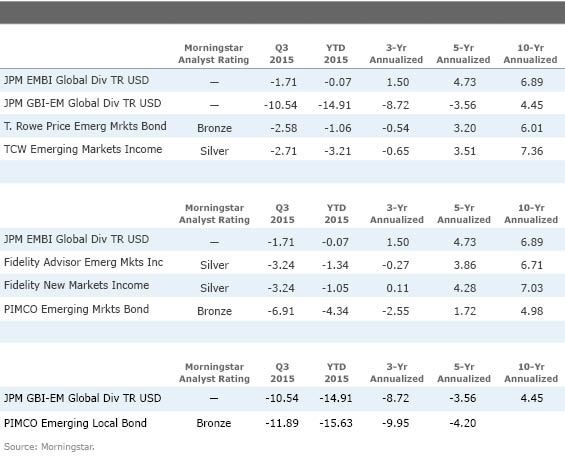Plunging Currencies Drive a Wedge in Emerging-Markets Bond Funds
Third-quarter sell-off causes a wide dispersion of returns between local- and hard-currency-focused funds.
Emerging-markets bonds have recovered a bit so far in October, but the third quarter was a painful reminder of the risks of emerging-markets currency.
The first table below shows recent and long-term returns through September 2015 for JPM EMBI Global Diversified, or JPM EMBI, which tracks hard-currency bonds (those denominated in U.S. dollars). The JPM CEMBI Diversified, or JPM CEMBI, comprises emerging-markets corporate bonds denominated in U.S. dollars, and the JPM GBI-EM Global Diversified, or JPM GBI-EM, tracks local-currency-denominated debt.
Indeed, the past few years have been rough for emerging-markets currencies and, thus, local-currency-denominated bonds because of various issues including slowing China growth, the oil and general commodity price slump, political turmoil in certain countries, and the impending Fed rate hike. Meanwhile, the U.S. dollar's continued surge has benefited hard-currency emerging-markets bonds and corporate debt, which is primarily denominated in dollars.

Actively managed emerging-markets bond funds come in four different flavors--hard currency, local currency, corporate, and blended (some combination of the three). Given this, emerging-markets bond funds have seen a wide dispersion of returns this year. The table below reflects the same set of performance numbers for Morningstar Medalist funds that take blended, hard-currency, and local-currency approaches relative to the hard- and/or local-currency benchmarks. (Morningstar does not issue ratings on any emerging-markets corporate-bond funds.)
Local-currency and blended funds were generally the hardest hit in the third quarter, though

Although the risks of local-currency bonds have been clear in recent years, funds that focus on hard-currency-denominated sovereigns and corporates can be hit hard during credit sell-offs. That's because they tend to have heavier exposure to lower-rated countries including Venezuela and Ukraine, which also tend to be less liquid.
The emerging-markets corporate space, which is less liquid overall, is also heavily focused on financials and oil and gas firms, making it more concentrated than developed-markets corporate indexes. Such risks caused the JPM EMBI and JPM CEMBI to slide by more than twice as much as the local-currency-focused JPM GBI-EM in 2008, for example.
Whatever approach is used, investors should use an emerging-markets bond fund strategically rather than as a tactical play to boost yield or total return and be mindful of existing emerging-markets exposure in core or multisector-bond holdings.
For a list of the open-end funds we cover, click here. For a list of the closed-end funds we cover, click here. For a list of the exchange-traded funds we cover, click here. For information on the Morningstar Analyst Ratings, click here.

/s3.amazonaws.com/arc-authors/morningstar/9117d33d-7edf-4c01-b517-49ddd5f2b25c.jpg)
/cloudfront-us-east-1.images.arcpublishing.com/morningstar/ZKOY2ZAHLJVJJMCLXHIVFME56M.jpg)
/d10o6nnig0wrdw.cloudfront.net/05-14-2024/t_958dc30e28aa4c8593f13c19505966e3_name_file_960x540_1600_v4_.jpg)
/cloudfront-us-east-1.images.arcpublishing.com/morningstar/OMVK3XQEVFDRHGPHSQPIBDENQE.jpg)
:quality(80)/s3.amazonaws.com/arc-authors/morningstar/9117d33d-7edf-4c01-b517-49ddd5f2b25c.jpg)